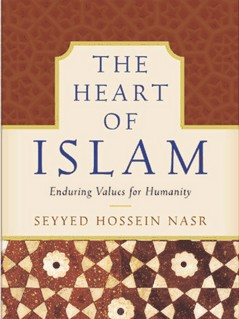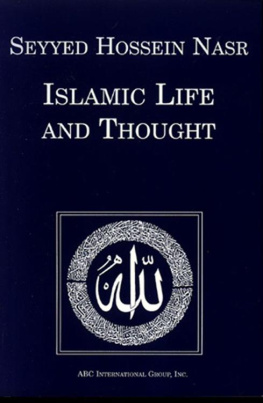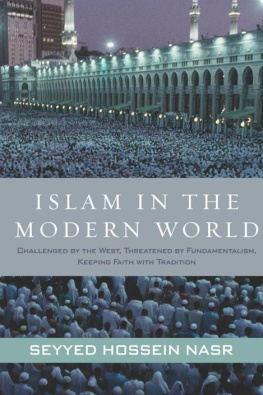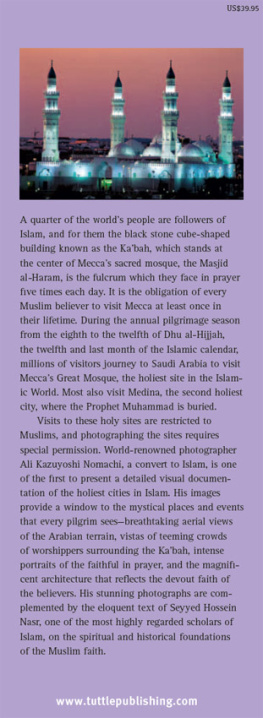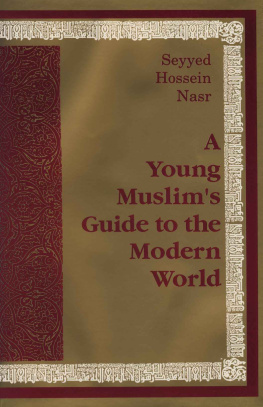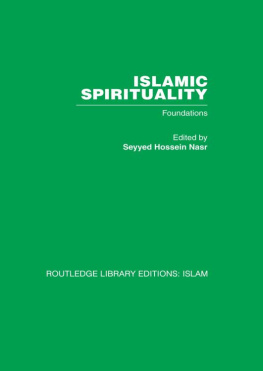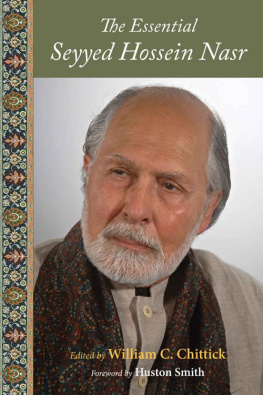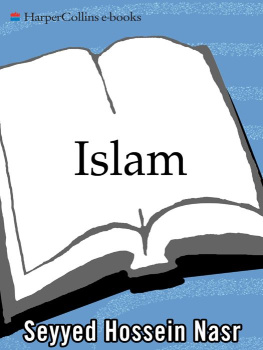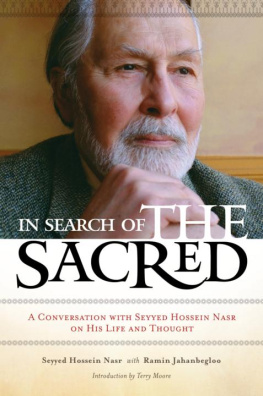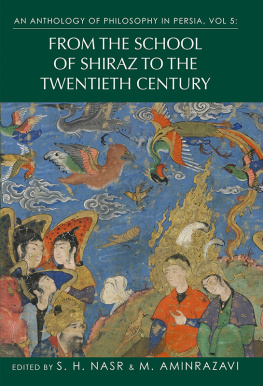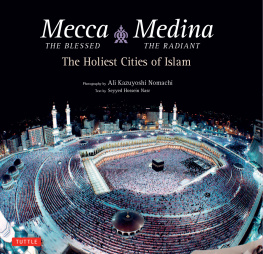Seyyed Hossein Nasr - The Heart of Islam
Here you can read online Seyyed Hossein Nasr - The Heart of Islam full text of the book (entire story) in english for free. Download pdf and epub, get meaning, cover and reviews about this ebook. year: 2009, publisher: HarperCollins, genre: Religion. Description of the work, (preface) as well as reviews are available. Best literature library LitArk.com created for fans of good reading and offers a wide selection of genres:
Romance novel
Science fiction
Adventure
Detective
Science
History
Home and family
Prose
Art
Politics
Computer
Non-fiction
Religion
Business
Children
Humor
Choose a favorite category and find really read worthwhile books. Enjoy immersion in the world of imagination, feel the emotions of the characters or learn something new for yourself, make an fascinating discovery.
- Book:The Heart of Islam
- Author:
- Publisher:HarperCollins
- Genre:
- Year:2009
- Rating:3 / 5
- Favourites:Add to favourites
- Your mark:
- 60
- 1
- 2
- 3
- 4
- 5
The Heart of Islam: summary, description and annotation
We offer to read an annotation, description, summary or preface (depends on what the author of the book "The Heart of Islam" wrote himself). If you haven't found the necessary information about the book — write in the comments, we will try to find it.
The Heart of Islam — read online for free the complete book (whole text) full work
Below is the text of the book, divided by pages. System saving the place of the last page read, allows you to conveniently read the book "The Heart of Islam" online for free, without having to search again every time where you left off. Put a bookmark, and you can go to the page where you finished reading at any time.
Font size:
Interval:
Bookmark:
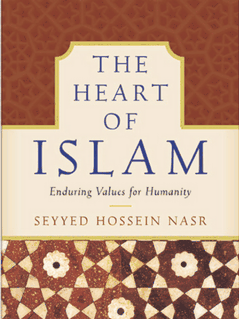
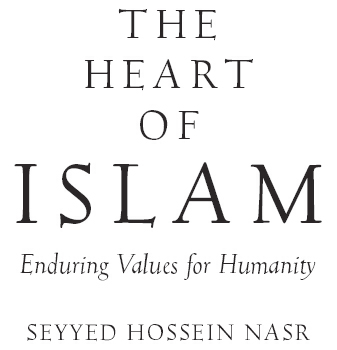

Dedicated to the Sacred and Enduring Presence of Shaykh Amad ibn Musaf
al-Shdhil al-Alaw
Contents
Civilizational Dialogue and the Islamic World
One God, Many Prophets
The Unity of Truth and the Multiplicity of Revelations
The Spectrum of Islam
Sunnism, Shism, and Sufism and Traditional, Modernist, and Fundamentalist Interpretations of Islam Today
Divine and Human Laws
The Vision of Community and Society
Compassion and Love, Peace and Beauty
Divine and Human Justice
Peace and the Question of War
Human Responsibilities and Human Rights
The Ethical and Spiritual Nature of Human Life, East and West
Civilizational Dialogue and the Islamic World
Preface
The past few decades have witnessed a growing interest in Islam in the West, increasing with each global event involving the name of Islam: from the Lebanese civil war to the Iranian Revolution of 1979 to the rise of Islamic movements among Palestinians. This rising interest now stands at unprecedented levels since the tragic events of September 11, 2001. The world is thirsty for information about Islam, especially in America, yet this thirst has generally not been quenched with healthy water. In fact, a torrent of knowledge has flooded the media from books to journals, radio, and television, much of which is based on ignorance, misinformation, and even disinformation. Not only has this torrent failed the cause of understanding, it has too frequently rendered the greatest disservice to the Western public in order to further particular ideological and political goals.
Of course, distortion of matters Islamic in the West is not new; it has a thousand-year-old history going back to monstrous biographies of the Prophet of Islam written mostly in Latin in France and Germany in the tenth and eleventh centuries. This earlier portrayal of Islam as a Christian heresy, however, still showed an intellectual respect for Islamic civilization and thought. During the Renaissance such figures as Petrarch abandoned even this respect in favor of outright disdain. During the eighteenth and nineteenth centuries, certain figures such as Voltaire tried to use aspects of Islam to attack Christianity, while a number of exceptional figures like Goethe and Emerson held Islamic teachings in great love and esteem. Meanwhile, the new methods of rationalist, historicist, and skeptical scholarship about religion growing out of the so-called Age of Enlightenment (which was in reality an age of the darkening of the soul and eclipse of the intellect) began to apply their methods to the study of Islam in the name of orientalism. Even when they were not serving colonial powers, most of these orientalists studied Islam in the arrogant belief that they possessed a flawless scientific method that applied universally to all religions. The last thing such scholars cared about was what Muslims, or for that matter Hindus or Buddhists, thought about their own religion and how they experienced their own religious universe. Of course, there were exceptions, but these only proved the rule. Orientalist studies of Islam began and ended with the unspoken presumption that Islam was not a revelation, but a phenomenon contrived merely by human agency in a particular historical situation. In this chorus the voices of Louis Massignon, H. A. R. Gibb, and Henry Corbin, followed by a later generation of sympathetic Western scholars such as Annemarie Schimmel, remain truly exceptional.
It was not until the second half of the twentieth century that born Muslims well versed in Western languages and methods of research and expression began to write in-depth works on Islam in European languages to explain the tradition in a serious way to the Western audience. They were joined in this task by a number of Western intellectual and spiritual figures and scholars who had been able to penetrate the Islamic universe of meaning and to speak and write from within the Islamic tradition. As a result of the efforts of these two groups, a number of authentic and profound books on various aspects of Islam appeared in English and other European languages. In contrast to earlier periods, such works were at least available, but their voices continued to be drowned out by the cacophonies of those who rejected Islam from positions of either Christian or Jewish polemicism or secular agnosticism. In fact, there is no religion about which so much has been written in the West by those opposed to it as Islam. No such parallel can be found for Taoism, Confucianism, Hinduism, or Buddhism.
Since the September 11 tragedy, with the rise of interest in Islamic matters, the cacophony has become louder, necessitating an explanation of the authentic teachings of Islam anew in light of the challenges of the present-day situation. This book is a humble effort toward achieving this end. It was commissioned by Harper San Francisco and has been written with the express purpose of explaining certain basic aspects of Islam and widely discussed issues in a manner acceptable to mainstream Islamic thought and comprehensible to the general Western public. It seeks to render a service to all those Westerners genuinely interested in understanding authentic Islam and its relation to the West rather than relying on the distorted images of Islam often presented to them. Needless to say, in a single book of this size it is not possible to deal with all the relevant issues, but I have sought to deal at least with the most significant ones in an effort to open a spiritual and intellectual space for mutual understanding. I also point to principles enabling Muslims and Westerners alike to live in peace and harmony with each other and to join hands against all those from both sides who seek to fan the fire of hatred and to precipitate clashes of civilizations and nations.
I wish to thank Stephen Hanselman of Harper San Francisco for his many suggestions for the book, Katherine OBrien for helping to prepare the manuscript for publication, and Joseph Lumbard for proofreading the manuscript. May this humble effort serve as a small step toward bringing about better understanding between people of good will in the West and in the Islamic world.
Bethesda, Maryland
March 2002
Dhul-ijjah A.H. 1423
One
ONE GOD,
MANY PROPHETS
The Unity of Truth
and the Multiplicity of Revelations
Say: He, God, is One, God the Self-Sufficient Besought of all. He begetteth not, nor is begotten, and none is like Him.
Quran 112: v.1-4
GOD THE ONE
At the heart of Islam stands the reality of God, the One, the Absolute and the Infinite, the Infinitely Good and All-Merciful, the One Who is at once transcendent and immanent, greater than all we can conceive or imagine, yet, as the Quran, the sacred scripture of Islam, attests, closer to us than our jugular vein. The One God, known by His Arabic Name, Allah, is the central reality of Islam in all of its facets, and attestation to this oneness, which is called tawhd , is the axis around which all that is Islamic revolves. Allah is beyond all duality and relationality, beyond the differences of gender and of all qualities that distinguish beings from each other in this world. Yet He is the source of all existence and all cosmic and human qualities as well as the End to Whom all things return.
To testify to this oneness lies at the heart of the credo of Islam, and the formula that expresses the truth of this oneness, L ilha illaLlh , There is no god but God, is the first of two testifications ( shahdah s ) by which a person bears witness to being a Muslim; the second is Muhammadun rasl Allh , Muammad is the messenger of God. The oneness of God is for Muslims not only the heart of their religion, but that of every authentic religion. It is a reassertion of the revelation of God to the Hebrew prophets and to Christ, whom Muslims also consider to be their prophets, the revelation of the truth that The Lord is one, the reconfirmation of that timeless truth that is also stated in the Catholic creed, Credo in unum Deum , I believe in one God. As the Quran states, We have never sent a messenger before thee except that We revealed to him, saying, There is no god but I, so worship Me (21:25). Like countless Muslims, when I read the names of the prophets of old in the Quran or in the traditional prayers, I experience them as living realities in the Islamic universe, while being fully conscious of the fact that they are revered figures in Judaism and Christianity. I also remain fully aware that they are all speaking of the same God Who is One and not of some other deity.
Next pageFont size:
Interval:
Bookmark:
Similar books «The Heart of Islam»
Look at similar books to The Heart of Islam. We have selected literature similar in name and meaning in the hope of providing readers with more options to find new, interesting, not yet read works.
Discussion, reviews of the book The Heart of Islam and just readers' own opinions. Leave your comments, write what you think about the work, its meaning or the main characters. Specify what exactly you liked and what you didn't like, and why you think so.

